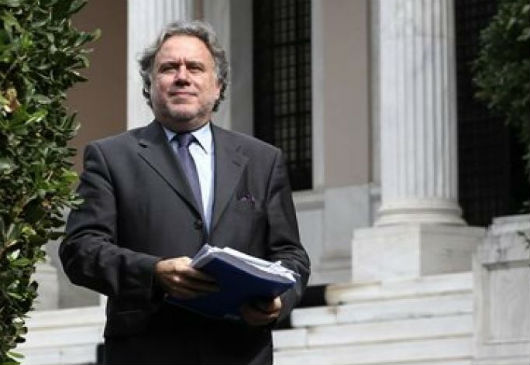 JOURNALIST: What imprint did the Prime Minister’s visit to Russia leave on the Greek Government?
JOURNALIST: What imprint did the Prime Minister’s visit to Russia leave on the Greek Government?
G. KATROUGALOS: We have re-established close bilateral relations and have laid down the foundations for further significant improvement, particularly at the economic level, and in the relations between the two peoples. 2019 will be a year of Language and Literature in both Greece and Russia.
JOURNALIST: What are the benefits for Greece of a re-establishment of close bilateral relations between the two countries?
G. KATROUGALOS: First of all, we have confirmed on yet another front that we are actually pursuing a multidimensional foreign policy. Furthermore, important transnational agreements were signed and synergies between Greek and Russian businesses were promoted in agri-food, shipbuilding and other sectors, which are important to the Greek economy. Equally significant were the discussions we had on energy, in connection with the European expansion of TurkStream.
JOURNALIST: Does Russia's opposition to the Prespa Agreement affect the relationship between the two countries?
G. KATROUGALOS: There has always been a mutual sympathy between the two peoples and a long-standing tradition of good interstate relations. However, the essence of foreign policy is inevitably determined by national interests. The Prime Minister has thoroughly explained to President Putin that the Agreement is not aimed against Russian interests. Nor was it dictated, at least as far as we are concerned, by other motives than the need to resolve in a mutually beneficial way an old dispute, and to stabilize the region of the Balkans. I believe that our position was clearly understood, as was Alexis Tsipras’ unambiguous statement that, for as long as he is Prime Minister, Greece will not act in the face of third-party pressure but exclusively in accordance with its own interests.
JOURNALIST: What do you expect from your visit to the US?
G. KATROUGALOS: The US is our strategic partner. We seek to deepen and improve our cooperation, in the context of our equal relationship; a relationship which is based on mutual respect and our common goal of strengthening security and stability in our region.
JOURNALIST: What is the reason behind your visit to the US?
G. KATROUGALOS: The US have invited a few countries whose role is important for international stability for a "strategic dialogue". That said, the quality, the depth and the extent of this process are unprecedented even for the US itself. The main difference between a "strategic dialogue" and a Joint Interministerial Committee is that the first is not limited to economic matters but encompasses all aspects of transnational relations, with particular emphasis placed on common geopolitical interests, defence and security. This does not mean that its economic dimension is not particularly important. We plan to discuss energy, trade and investment, and put the stress on innovation and cutting-edge technologies. We wish not only to maintain, but to give a new boost to, the very positive momentum of the Thessaloniki International Fair.
JOURNALIST: What will you say to the US Secretary of State Michael Pompeo?
G. KATROUGALOS: In my discussions with Mr Pompeo and the National Security Advisor, Mr John Bolton, I will highlight not only the national issues, but above all the role of our country as a provider of security and stability in the Mediterranean and the Balkans. Besides the emblematic Prespa Agreement, our Government has also initiated many other complex diplomatic processes. For example, I can mention the trilateral cooperation schemes with Cyprus, Israel, Egypt, Jordan, Lebanon and Palestine but also similar ones in the Balkans. The Rhodes Conference, which seeks to establish a local security system in the Eastern Mediterranean, and which already comprises 14 Arab and 8 Southeast European countries. The Conference for the protection of cultural and religious communities in the Middle East. These initiatives reinforce stability in the region and deter contrary efforts by third parties.
JOURNALIST: Do you think that Greece’s rapprochement with Russia may adversely affect Greek-American relations?
G. KATROUGALOS: No, and therein lies the essence of the multidimensional policy. Our Prime Minister made it very clear in Russia: The EU is our political home, and we are a member of NATO. Yet, we also want to be a bridge of communication and dialogue between the West and Russia, given our firm position that a European security system without the incorporation of this country is inconceivable.
JOURNALIST: Is it possible for Greece to have a satisfactory margin of manoeuvring between Moscow and Washington?
G. KATROUGALOS: Under the conditions I mentioned before, of course. And not only between these two capitals. We have sought, and to a large extent, succeeded, in making ourselves heard and recognized as a voice for stability and peace.
JOURNALIST: Is the Prespa Agreement "dead" after Zaev’ s recent declarations?
G. KATROUGALOS: On the contrary, we were given an opportunity to settle issues, and to flag up the importance of the agreement for the definitive end of irredentism.
JOURNALIST: Zaev’ s provocations never stop. Does Athens’ response amount to a revision of its position?
G. KATROUGALOS: There were indeed statements which failed to capture the spirit and letter of the Agreement and which could be misinterpreted at our expense. That is why a strict message was sent at the highest level, during my meeting with the Minister of Foreign Affairs, Nikola Dimitrov, but also with Mr Nimetz. I also raised the issue during talks I had with the Secretary-General of NATO, Mr Stoltenberg and Mrs Mogherini, as well as in the course of EU and NATO Ministerial meetings. The message was received. Of course, we continue to keep a close eye on developments, especially the final shape of the revision, and I assure you that we will do everything we can to guarantee a full implementation of the provisions of the agreement.
December 11, 2018


